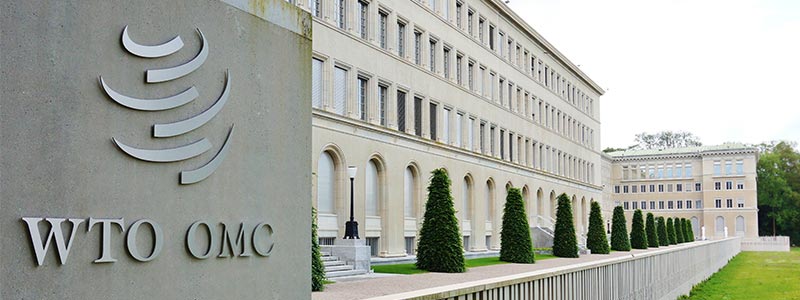International trade: fears grow for the future of the WTO as US changes tack
Jonathan Watson

These are confusing times for those involved in international trade. One week, for example, President Trump describes the European Union as a ‘foe’ of the US because of ‘what they do to us in trade’. The next week, he has a meeting with Jean-Claude Juncker, the President of the European Commission, and welcomes a ‘new phase in the relationship’ with the EU on what he says is ‘a very big day for free and fair trade’.
The World Trade Organisation is supposed to promote free and fair trade, but Trump does not seem to like that very much either. The current US ambassador to the WTO, Dennis Shea, recently said that rulings by its Appellate Body, effectively the supreme court of world trade, should be considered invalid if they are issued after the official 90-day deadline. Rulings would no longer be governed by ‘reverse consensus’, whereby they are blocked only if all WTO members oppose them.
Many observers have noted that there is irony in the US position on this. The Appellate Body is having difficulty complying with these deadlines because it is understaffed, which is a direct result of the US blocking new members. ‘It’s rather disingenuous for the US to threaten to veto Appellate Body decisions when it helped to cause the problem in the first place,’ says one member of the trade community.
In addition, one might expect a leading member of the WTO to seek a solution to the problem, rather than threatening to disrupt the system by proposing simply to veto ‘late’ decisions, says Matthew Nicely, a partner in the international trade practice at US law firm Hughes Hubbard. ‘This is very similar to the current Administration’s adoption of a very broad interpretation of “national security”. In both instances, the US is adopting a unilateralist approach, which is admittedly very pro-sovereignty, but completely inconsistent with the international legal system that we worked so hard over the last 70 years to create.’

World Trade Organisation headquarters in Geneva, Switzerland
US unhappiness about the Appellate Body is not new, says Mark Clough QC, a senior counsel in Dentons’ Brussels office. ‘If the US is going to stay in the WTO, it wants it to be efficient,’ he says. ‘I can sympathise with their point about the lateness of the decisions – some of the other members, including the EU, are also concerned – but any objections about the substance of those decisions would be entirely inappropriate.’
According to Eric White, consultant at Herbert Smith Freehills, the Appellate Body could address this US objection by sticking to the 90-day deadline and restricting itself to the essential elements of a dispute, rather than examining every issue in great detail and getting involved in lawmaking. ‘There would be shorter reports and less speculation about what various provisions might mean in certain circumstances which is then referred to in other cases,’ he says.
However, in return for that, the Appellate Body is likely to ask for more staff and for fewer objections to its rulings to make its caseload more manageable. While such a package is possible, White says, he thinks the US has not been very responsive so far to attempts to address its concerns. ‘They don’t want to engage,’ he says. ‘They simply keep saying they’re unhappy and telling others to go away and find a solution.’
“The US doesn’t want to engage… its officials simply keep saying they’re unhappy and telling others to go away and find a solution
Eric White
Consultant, Herbert Smith Freehills
The overall aim seems to be to weaken the system, to show that the US is a member above all other members, and to claim that its arguments should be given particular attention. ‘They want to increase the role of power and undermine the principle that all WTO members are equal,’ says White, a member of the European Commission's legal service between 1985 and 2016. For some of that time, he led its trade policy and WTO team.
There have been claims that the Trump Administration’s ultimate aim is to leave the WTO. This would potentially be very damaging to the world economy. ‘US leadership has been critical to the creation and workings of the WTO,’ says Nicely. ‘Someone has to step into those shoes. The EU could do so, but it would be odd for the world’s largest economy to leave the system. That said, the rest of the world would need the WTO in order to prevent the mass economic failure around the world that is likely to occur if there is no rules-based trading system.’
Such a move might not destroy the WTO altogether. White believes that if the US does leave, the other parties will continue. ‘That’s what has happened with the Paris climate agreement,’ he says. ‘People said it was essential to have the US as part of the agreement, but the others have agreed to carry on, despite Trump’s decision to withdraw. Similarly, with the WTO, the others would try to preserve what is still there, rather than abandon everything.’
Eric Jiang, senior partner at Chinese law firm Jurisino Law Group and an officer of the IBA International Trade and Customs Law Committee, thinks the global trading system is strong enough to withstand the current fluctuations in US trade policy. ‘There is a solid legal mechanism established by the WTO and multiple regional free trade agreements,’ he says. ‘It is like a great wall – it cannot be pulled down overnight.’
The US also has to consider whether leaving the WTO would really serve its interests. ‘It would mean that any country would be able to take any measure it likes against US trade, without any fear of being referred to a dispute settlement system,’ says White.
